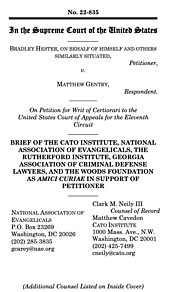In 2017, Petitioner Bradley Hester was arrested in Cullman County, Alabama, and charged with one misdemeanor count of possessing drug paraphernalia. An otherwise-identical person could have bought pretrial release for $1,000 in cash bail. But because Mr. Hester was indigent, he was locked up and had to wait two days for an initial appearance. At that hearing, the magistrate did not inquire into Mr. Hester’s ability to pay his bail nor consider whether continuing to detain him was necessary to protect public safety or prevent flight. Mr. Hester was not given counsel. He remained in jail.
Mr. Hester then entered a federal lawsuit challenging Cullman County’s bail practices. The county entered a new “Standing Bail Order” supposedly containing reforms, but county officials did not follow that order, according to the district court overseeing the federal case. The district court found that the county likely violated the constitutional right to pretrial liberty and entered a preliminary injunction. The Eleventh Circuit then reversed, holding that there is no fundamental right to pretrial release.
Assisted by law students working with the Emory Law School Supreme Court Advocacy Program (ELSSCAP), Cato filed an amicus brief asking the Supreme Court to reverse this decision. The brief was joined by the National Association of Evangelicals, Rutherford Institute, Georgia Association of Criminal Defense Lawyers, and Woods Foundation.
The brief argues that Cullman County’s bail system violates the Due Process Clause of the Fourteenth Amendment. It traces the development of the right to pretrial release from its roots in medieval England all the way through modern times. It notes that the Anglo-American legal tradition went to great lengths to minimize pretrial detention, whose purpose was limited to securing appearance at trial. The brief also observes that the lack of severity in an offense (like Mr. Hester’s minor drug charge) is a strong reason to grant pretrial release. The brief argues that pretrial liberty is not merely the entitlement of the rich: it’s the constitutional right of every American.


